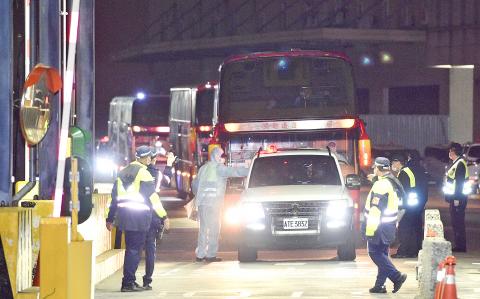The first chartered airplane evacuating 247 Taiwanese from Wuhan, China, returned to Taiwan at about 11:50pm on Monday, with three people quarantined in a hospital after their arrival, Minister of Health and Welfare Chen Shih-chung (陳時中) said yesterday.
Five people were taken to a hospital: one with a fever, two who had mild respiratory symptoms and a child with stomach pain who was accompanied by his mother, Chen said.
The three with symptoms were hospitalized in negative-pressure isolation wards for further examination, while the child was later released from hospital and taken with his mother to a quarantine location for evacuees.

Photo: Peter Lo, Taipei Times
Later last night, Chen said one of the three tested positive for the virus, raising the total number of cases confirmed in Taiwan to 11.
Earlier, he said that 69 evacuees were taken to a quarantine station in central Taiwan, 29 were taken to a location in New Taipei City’s Wulai District (烏來) and 145 to Linkou District (林口).
“All virus-screening procedures were conducted with the highest standards at the airport on Monday night,” he said, adding that other people at the airport were not exposed to the airplane and the passengers.
The procedures were completed at about 3am yesterday, Chen said, adding that he traveled to the quarantine station in central Taiwan to be there for the evacuees’ arrival at about 5am.
Resettlement and disinfection were finished at about 6:20am, he added.
All three quarantine stations have security and healthcare teams to take care of the evacuees, overseeing their living arrangements and health status, over the next 14 days, Department of Medical Affairs Director-General Shih Chung-liang (石崇良) said.
The evacuees are housed in separate rooms, except for a one-year-old staying with a parent, that are on the second floor or above to reduce exposure to the outside environment, he said, adding that they would be taking their meals in their rooms.
During the Lunar New Year holiday, the Mainland Affairs Council asked Beijing to allow Taiwan to evacuate Taiwanese in Wuhan, Department of Legal Affairs head Tsai Ji-ru (蔡志儒) said.
After negotiations, Monday’s humanitarian operation proved successful, but further negotiations would be needed to confirm whether another evacuation is possible, Tsai said.
“There were many innocent and cute children among the evacuees, so I felt a little emotional when thinking about how anxious they might have felt while they were stranded in Wuhan,” Chen said. “We felt like we accomplished something significant.”
Most of the evacuees were cooperative and kept calm during the process, Chen said, thanking all the people who helped make the evacuation possible.
People should not be too concerned about the quarantine stations or the risk of exposure to evacuees, as they are all a proper distance from each other, he added.
President Tsai Ing-wen (蔡英文) yesterday posted on Facebook that the government recognizes China for its efforts in getting Taiwanese back to Taiwan.
The government is grateful to all the departments and personnel on both sides of the Taiwan Strait who helped accomplish the evacuation, Tsai said.

CROSS-STRAIT COLLABORATION: The new KMT chairwoman expressed interest in meeting the Chinese president from the start, but she’ll have to pay to get in Beijing allegedly agreed to let Chinese Nationalist Party (KMT) Chairwoman Cheng Li-wun (鄭麗文) meet with Chinese President Xi Jinping (習近平) around the Lunar New Year holiday next year on three conditions, including that the KMT block Taiwan’s arms purchases, a source said yesterday. Cheng has expressed interest in meeting Xi since she won the KMT’s chairmanship election in October. A source, speaking on condition of anonymity, said a consensus on a meeting was allegedly reached after two KMT vice chairmen visited China’s Taiwan Affairs Office Director Song Tao (宋濤) in China last month. Beijing allegedly gave the KMT three conditions it had to

STAYING ALERT: China this week deployed its largest maritime show of force to date in the region, prompting concern in Taipei and Tokyo, which Beijing has brushed off Deterring conflict over Taiwan is a priority, the White House said in its National Security Strategy published yesterday, which also called on Japan and South Korea to increase their defense spending to help protect the first island chain. Taiwan is strategically positioned between Northeast and Southeast Asia, and provides direct access to the second island chain, with one-third of global shipping passing through the South China Sea, the report said. Given the implications for the US economy, along with Taiwan’s dominance in semiconductors, “deterring a conflict over Taiwan, ideally by preserving military overmatch, is a priority,” it said. However, the strategy also reiterated

‘BALANCE OF POWER’: Hegseth said that the US did not want to ‘strangle’ China, but to ensure that none of Washington’s allies would be vulnerable to military aggression Washington has no intention of changing the “status quo” in the Taiwan Strait, US Secretary of Defense Pete Hegseth said on Saturday, adding that one of the US military’s main priorities is to deter China “through strength, not through confrontation.” Speaking at the annual Reagan National Defense Forum in Simi Valley, California, Hegseth outlined the US Department of Defense’s priorities under US President Donald Trump. “First, defending the US homeland and our hemisphere. Second, deterring China through strength, not confrontation. Third, increased burden sharing for us, allies and partners. And fourth, supercharging the US defense industrial base,” he said. US-China relations under

The Chien Feng IV (勁蜂, Mighty Hornet) loitering munition is on track to enter flight tests next month in connection with potential adoption by Taiwanese and US armed forces, a government source said yesterday. The kamikaze drone, which boasts a range of 1,000km, debuted at the Taipei Aerospace and Defense Technology Exhibition in September, the official said on condition of anonymity. The Chungshan Institute of Science and Technology and US-based Kratos Defense jointly developed the platform by leveraging the engine and airframe of the latter’s MQM-178 Firejet target drone, they said. The uncrewed aerial vehicle is designed to utilize an artificial intelligence computer